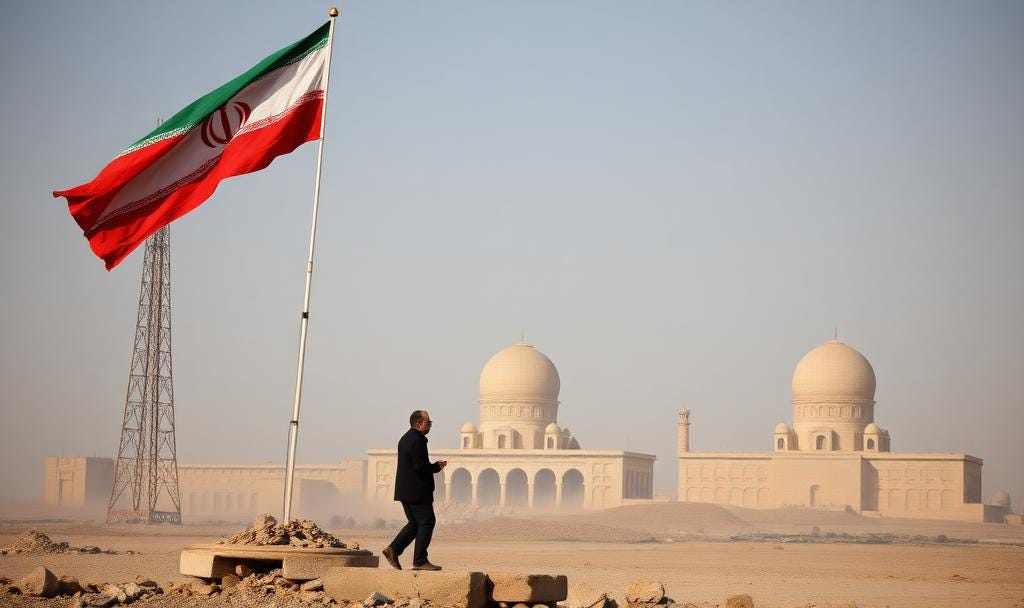10 Things Global News - 6th October 2025
The news from around the world
Rubio Says Gaza Conflict Still Unresolved
Iran Declares IAEA Deal ‘No Longer Relevant’
Pelicot Returns to Court for Appeal Hearing
Judge Halts Guard Deployments to Oregon
Trump Open to Nuclear Limits With Russia
Macron Unveils New Cabinet Amid Deadlock
Trump Hints at Land Strikes After Venezuela Hit
Nikkei Hits Record as Takaichi Lifts Risk Appetite
Babis Wins Czech Election, Pledges Pro-West Course
Protests in Georgia Met With Police Crackdown
On this day ….
On this day in 1973, Egypt and Syria launched a coordinated assault on Israeli positions in the Sinai and Golan Heights, beginning the Yom Kippur War. The shock forced Israel to confront its strategic assumptions and drew the U.S. and Soviet Union into a wider contest for regional influence.
The conflict’s diplomatic aftermath—U.S. mediation, Egyptian pragmatism, and a security-first peace—still defines the regional order.
Half a century later, as Gaza burns and Egypt again mediates between combatants, the same architecture of deterrence without reconciliation continues to hold, but only barely.
US Secretary of State Marco Rubio said the Gaza war is not over, even as Israel and Hamas prepare to meet in Cairo to discuss President Trump’s proposed peace plan. He told NBC News the talks would quickly show whether Hamas is serious about releasing the remaining hostages.
Under the plan, Hamas would free forty-eight captives within three days in exchange for Israel halting its offensive, releasing Palestinian prisoners and allowing aid to enter Gaza.
Rubio also said Israel’s prolonged campaign has damaged its standing worldwide. At the United Nations, the US has cast six vetoes blocking resolutions calling for a permanent ceasefire, leaving Washington isolated as most member states demand an immediate truce.
Several Western powers, including France, Britain, Australia and Canada, have now recognised a Palestinian state, signalling shifting support as the conflict nears its second year.
Sources: The Guardian, Reuters
Iran’s foreign minister Abbas Araghchi has said cooperation with the UN’s nuclear watchdog is “no longer relevant” after Western nations reinstated sanctions under the 2015 nuclear accord’s snapback mechanism. He told diplomats in Tehran that Britain, France and Germany had “eliminated justification for negotiations” by triggering the measure, which restored UN penalties lifted under the earlier agreement.
The decision effectively nullifies a deal signed last month with the International Atomic Energy Agency that was meant to restore monitoring and inspections. Araghchi said the European trio had weakened their influence in future talks but noted there was still “room for diplomacy.”
He reaffirmed Iran’s right to pursue civilian nuclear activity under the Non-Proliferation Treaty and said Tehran remained open to solutions that could build confidence in its programme despite recent tensions and Israeli strikes on its facilities.
Sources: Al Jazeera, NHK
Gisèle Pelicot, whose case became a landmark in France’s reckoning with sexual violence, returned to court on Monday as one of the 51 men convicted of raping her appeals his sentence. Over nearly a decade, her former husband, Dominique Pelicot, drugged her and invited strangers to assault her while she was unconscious.
Fifty-one men were found guilty in the original trial last December, which exposed widespread complicity and forced national debate about consent and “chemical submission.”
Only one man, Husamettin Dogan, continues to contest his conviction, arguing that he was “trapped” by her husband. The new trial in Nîmes is expected to last four days. Ms. Pelicot, now 72, has said she would rather avoid “this ordeal” but considers it her duty to attend. She has since become a global symbol of courage, inspiring reforms to France’s legal definition of rape and sex education curriculum.
Source: New York Times, France 24
A federal judge issued a temporary restraining order on Sunday blocking the Trump administration from deploying any National Guard units to Oregon, after the president sent California troops to Portland despite an earlier order barring the use of Oregon’s own guard.
U.S. District Judge Karin Immergut questioned how bringing in forces from California and Texas did not circumvent her prior ruling, and broadened the order after a Pentagon memo said up to 400 Texas personnel were being activated for Oregon, Illinois and possibly elsewhere.
California and Oregon sought the order together. Oregon’s governor said protests outside a Portland immigration facility were small and confined to one block, arguing there was no need for military intervention. Immergut said the conditions did not justify federalised forces and that deployment could harm state sovereignty. California’s governor said the state’s guard would be heading home, while Texas’ governor said he had authorised a call-up.
Sources: Associated Press, LA Times
US President Donald Trump said Moscow’s offer to voluntarily maintain caps on deployed strategic nuclear weapons “sounds like a good idea,” signalling openness to mirror Russia’s proposal. The offer would keep limits set under the New START accord, which expires in early February 2026, if both sides reciprocate.
The remarks come amid strained ties. Russia has halted participation in New START inspections, and its UN envoy said Washington had yet to respond to the proposal. Tensions have also risen amid reported incursions of Russian drones into NATO airspace.
In a separate video, Vladimir Putin warned that supplying long-range Tomahawk missiles to Ukraine would destroy recent positive trends in US–Russia relations. US officials have considered Ukraine’s request, while one official and three other sources said sending Tomahawks may not be viable given current inventories committed elsewhere.
Sources: Reuters, Moscow Times
President Emmanuel Macron has unveiled a new government nearly a month after appointing Prime Minister Sébastien Lecornu, as France remains mired in political deadlock. Lecornu, Macron’s seventh prime minister, faces a fractured parliament and opposition threats to topple his administration if it fails to break with past policies. The new cabinet keeps many key ministers in place, while former economy minister Bruno Le Maire moves to defence and Roland Lescure takes over finance to steer austerity budget talks.

Opposition leaders denounced the reshuffle as “continuity”, with both the far right and hard left promising no-confidence motions. The National Rally said it was “either a break with the past or a vote of no confidence,” while Socialist and France Unbowed figures accused Macron of ignoring electoral defeats. With France’s debt near record levels, Lecornu’s survival may depend on delicate compromises across rival blocs.
Sources: The Guardian, RFI
US President Donald Trump said American forces struck another vessel allegedly carrying drugs off Venezuela’s coast and suggested operations could soon extend onto land. Speaking at a naval ceremony in Virginia, he praised the Navy for “blowing the cartel terrorists out of the water” and said traffickers would now be forced to shift overland. The remarks followed a series of at least four US attacks in the Caribbean in recent weeks that Washington describes as part of its “war on drugs.”
Defence Secretary Pete Hegseth said he had “every authorisation needed” for the strikes, citing designations of cartels as foreign terrorist organisations. Venezuela and Russia condemned the attacks, with Moscow warning of escalation and pledging support to Caracas.
Legal experts in the US argue the operations lack a firm legal basis under domestic or international law and bypass due process against alleged criminals.
Sources: South China Morning Post, Al Jazeera
Tokyo stocks surged after Sanae Takaichi won the ruling party leadership, with the Nikkei 225 jumping more than 4% to a record above 47,000. The index reached 47,187.69 at 9:03 a.m., while the yen weakened from about ¥147.5 to ¥149.6 to the dollar. Takaichi, a pro-stimulus conservative and former economic security minister, is set to succeed Shigeru Ishiba as Liberal Democratic Party president, a move that all but ensures her election as prime minister next week.
The yen slid past 150 against the dollar and to a record low versus the euro, while long-term bonds fell; the 40-year yield rose as much as 17 basis points to 3.55%. Two-year yields moved the other way, and swaps cut the chance of a Bank of Japan rate rise this month to about 25% from 60%. Stocks rallied broadly.
Sources: Japan Times, Bloomberg
Czech billionaire Andrej Babis and his ANO party won the national election with 34.5% of the vote, securing 80 seats in the 200-member parliament. The former prime minister, who served from 2017 to 2021, began coalition talks with two smaller right-wing parties — the Freedom and Direct Democracy movement and the Motorists — to form a majority government. President Petr Pavel said he would name the new administration no earlier than November to allow time for negotiations.
Babis, who co-founded the far-right Patriots for Europe bloc with Hungary’s Viktor Orban, sought to reassure Western allies by describing himself as pro-European and committed to NATO.
However, he has questioned continued military aid to Ukraine and pledged to review the Czech-led initiative that has sent 3.5 million artillery shells to Kyiv. He said he would discuss the programme’s future directly with President Zelensky.
Sources: Le Monde, BBC
Tens of thousands of protesters rallied in Tbilisi on Saturday, clashing with police outside the presidential palace during municipal elections boycotted by the opposition. Officers used water cannons and pepper spray to repel demonstrators who tried to force entry into the palace gates, calling for “power back into the hands of the people.” The protests were organised to denounce what activists described as political backsliding under the ruling Georgian Dream party.
Demonstrators accused the government of abandoning Georgia’s European path after it froze EU accession talks last year, sparking recurring protests met with arrests and restrictions on media and civil society. Prime Minister Irakli Kobakhidze insisted the country’s EU trajectory “remains steady and irreversible.”
The election, which saw turnout under 30%, was monitored by domestic observers but not by major international watchdogs such as the OSCE or European Parliament. A police presence persisted on Sunday.















